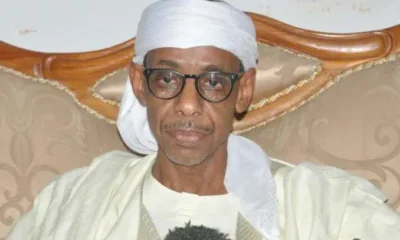Business
“Why I support higher interest rates in Nigeria” – Cardoso
Olayemi Cardoso, the Governor of the Central Bank of Nigeria (CBN), has emphasized the necessity of maintaining higher interest rates to address the persistent inflation issues plaguing the Nigerian economy.
The governor made this comment in his statement in the recently released ‘Personal Statement’ of the Monetary Policy Committee (MPC) members at the MPC meeting held between May 20 and 21, 2024.
The personal statements help show the decision-making of committee members responsible for monetary policy in the country. It also highlights their voting patterns.
Cardoso stated that tighter monetary policy accompanied by higher interest rates was at their disposal to solve the challenges of high inflation.
Cardoso also mentioned that while inflation had accelerated sharply at the beginning of 2024, there had been a noticeable deceleration in the past three months.
Despite this, he pointed out that year-on-year inflation still saw a slight increase in April.
He outlined several factors contributing to the inflationary pressures, including potential upward revisions of the minimum wage, adjustments in electricity tariffs, higher fuel prices, low agricultural output due to insecurity, elevated consumption during festive seasons, and the pass-through effects of exchange rate depreciation.
These factors, he stressed, would continue to be closely monitored to prevent a reversal of the disinflation progress achieved thus far.
Cardoso explained that the MPC was faced with two primary policy options; either retaining the current rates or tightening further to sustain the disinflation trend.
He acknowledged that there were valid arguments for holding the policy rates, such as moderating borrowing costs for the government and private sector, alleviating challenging economic conditions, and reflecting the positive results of previous tightening rounds.
However, Cardoso also presented compelling reasons for further tightening.
Because inflation will rise if they “rest” on higher rates
“There is no evidence that the downward trend in month-on-month inflation rate is sustainable and would eventually manifest in downward trend in headline inflation. More so, considering the various upside risks to price development from both the global and domestic economies, there is sufficient reason to be concerned about the continued uptick in inflation if we rest on our oars at this critical point.”
Because higher interest rates will help attract FPIs
“Furthermore, tightening will help to sustain the current momentum of capital inflows into the economy and provide necessary support for the currency in the near term. It is important to highlight that lingering high interest rates in advanced economies present a real dilemma for emerging market economies seeking to attract capital inflows, and we must ensure that interest rate differentials remain sufficiently competitive by achieving positive real rates in the short term. “
Because a higher interest rate is the only major tool they have
“We must also not lose sight of the fact that inflation is the major problem. A tighter monetary policy stance with the accompanying higher interest rates is policy tools we have at our disposal to solve the problem from a monetary angle, even as we admit that there are structural issues that must also be addressed alongside by various stakeholders.”
Ultimately, Cardoso expressed his conviction to align with other MPC members in voting for further tightening.
His personal statement read: “After careful consideration, I was convinced to align with other members of the Monetary Policy Committee to vote for further tightening of the stance of policy. I, therefore, voted to increase MPR by 150 basis points from 24.75%to 26.25% .”
Cardoso’s advocacy for higher interest rates reflects a determined approach to combating inflation and ensuring economic stability but acknowledges both the monetary and structural challenges that need to be addressed in Nigeria’s economic landscape.
After its meeting, the MPC increased the benchmark interest rate by 150 basis points to 26.25% from 24.75%. It also retained the Cash Reserve Ratio (CRR) of Deposit Money Banks (DMBs) at 45% and put the Asymmetric corridor around the MPR at +100 and –300 basis points. The bank further set the liquidity ratio of banks at 30%.





















